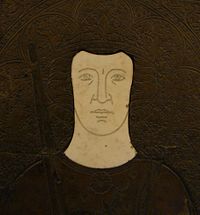Erik Menved
| Eric VI Menved | |||||
|---|---|---|---|---|---|

Eric VI on his tomb.
|
|||||
| King of Denmark | |||||
| Reign | 1286–1319 | ||||
| Coronation | 25 December 1287 | ||||
| Predecessor | Eric V Klipping | ||||
| Successor | Christopher II | ||||
| Regent | Agnes of Brandenburg | ||||
| Born | c. 1274 | ||||
| Died | 13 November 1319 (aged 44–45) Roskilde |
||||
| Burial | St. Bendt's Church | ||||
| Consort | Ingeborg Magnusdotter of Sweden | ||||
| Issue among others... |
Valdermar Eric Magnus 11 others |
||||
|
|||||
| House | Estridsen | ||||
| Father | Eric V Klipping | ||||
| Mother | Agnes of Brandenburg | ||||
| Religion | Roman Catholicism | ||||
| Full name | |
|---|---|
| Eric Eriksen |
Eric VI Menved (1274 – 13 November 1319) was King of Denmark (1286–1319) and a son of Eric V and Agnes of Brandenburg.
He became king in 1286 at age 12, when his father was murdered on 22 November by unknown assailants. Since Eric VI was only 12 years old, his mother ruled for him until 1294.
Eric Menved’s rule was a central period during the “Age of Decay" in Denmark 1241–1340. His early reign – during which he was led by his mother and her German relatives – was affected by the unrest and wars that followed the murder of his father.
The first act of the new government was to settle the case of the former king’s murder at a court convened at Nyborg at Whitsun 1287. 27 honorable men were appointed to decide the case. Chief among the accused were Marshal Stig Andersen Hvide and Jacob Nielsen, Count of Halland and seven others were accused. After a one-day trial, the jury found all the accused guilty. The properties and incomes of the condemned were declared forfeit and they were exiled from Denmark on pain of death. Even the pope became involved when he excommunicated those who had been judged guilty.
The verdict was questionable on several counts. None of the accused could be proven to be in the immediate vicinity when the king was stabbed to death. The accused were not allowed to swear their innocence before the court or have other honorable men swear as to their innocence, a right granted to them by law. Despite the unclear circumstances surrounding Eric V’s death, the jury only took one day to arrive at a guilty verdict. The accused had all belonged to Erik V's inner circle; it is uncertain what they were supposed to gain by the king’s death. For these reasons historians Erik Arup and Hugo Yrwing have labelled the verdict as a miscarriage of justice. They consider the murder a result of a power struggle between two noble factions, one led by Marsk Stig and one led by Valdemar, Duke of South Jutland. Duke Valdemar had fallen from grace in 1283, but quickly rose in influence after 1288. They suggest that Valdemar and his allies conspired to kill the king and then to successfully cast suspicion on their rivals at court. Another historian, Kai Hørby, has pointed out that the murder might well have its origin in the dynastic struggle for the throne of Denmark. There were others who thought they had equal or better claim to the throne than Eric V, such as Norway's king, Eirik Magnusson and his brother and successor Haakon V who were grandsons of Eric IV of Denmark.
...
Wikipedia
